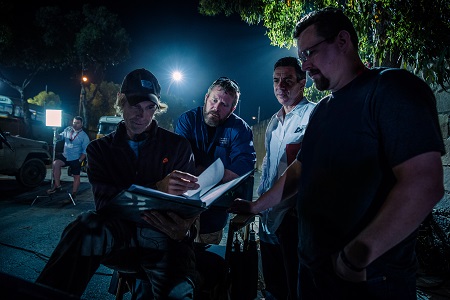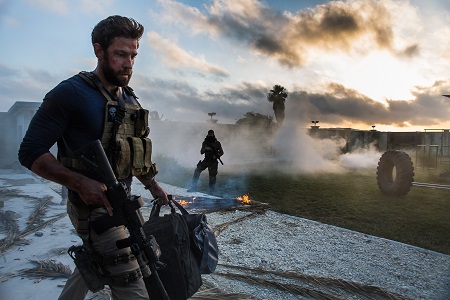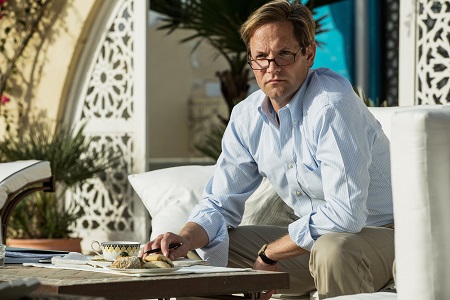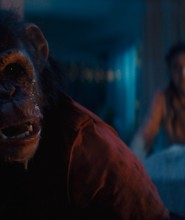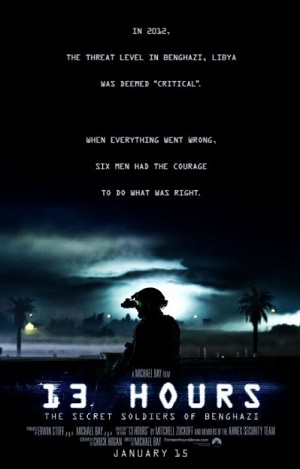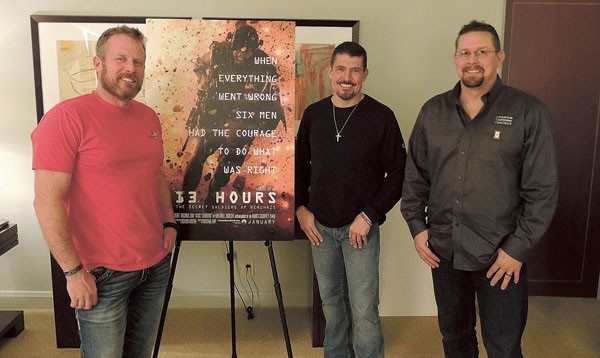
“13 Hours” – Interview with Kris ‘Tanto’ Paronto, John ‘Tig’ Tiegen and Mark ‘Oz’ Geist
by Sara Michelle Fetters - January 14th, 2016 - Interviews
Service and Sacrifice
An Interview with Benghazi Military Contractors Mark “Oz” Geist, John “Tig” Tiegen and Kris “Tanto” Paronto
I’d read about two-thirds of author Mitchell Zuckoff’s book 13 Hours: The Secret Soldiers of Benghazi when I walked into an interview with the three CIA annex security officers who helped him write it, former Marines Mark “Oz” Geist and John “Tig” Tiegen and ex-U.S. Army Ranger Kris “Tanto” Paronto. The three men were right at the center of those tragic events that took place on September 11, 2012 in Benghazi, Libya, and while I had not seen the movie at the time of our chat my interest to hear them talk about their collective travails was still quite high.
At the same time, I still wanted to make sure I treated each man with the respect that they deserved. As such, I felt it only just to let each of them introduce themselves and their backgrounds as we were getting started.
Mark “Oz” Geist: Mark Geist. Call sign Oz. I joined the Marine Corp in 1984. Did 12 years and became a cop after that. I started contracting in 2004, and did that up until the point I got blown up in Benghazi.
John “Tig” Tiegen: John Tiegen. Call sign Tig. Did four years in the Marine Corp. Started contracting in 2003. Did that pretty much all the way through 2013.
Kris “Tanto” Paronto: Kris Paronto. Call sign Tanto. Was in the 2nd Ranger Battalion stationed here over at Ft. Lewis. Also served in the 8th Battalion, Special Forces. Served eight years. Started contracting in 2003 and did that for pretty much ten years, including some time after Benghazi. I also carried the team that night.
Tig: Yeah. He was bringing us chow.
Oz: Brought us water. You know that guy that you have on the football team? The guard-and-tackle? The guy that sits at the end of the bench and guards the water and protects the tackle? That was Tanto.
All joking aside, it’s quickly apparent just how connected these three men are, able to finish one another’s thoughts and sentences, as well as engage in a brotherly put-down, at the drop of a hat. With only 15 minutes to chat, our conversation covered as much ground as it could, each man more than willing to speak about their experiences in Benghazi as well as what it was like standing on a film set alongside director Michael Bay seeing it reenacted. Here are some of the highlights from that conversation:
Sara Michelle Fetters: What is that people don’t know about contractors? As former Marines and an ex-Ranger, what do you want people to understand about that job? What are the misconceptions?
Tanto: I think people turn us into mercenaries. That’s completely false. Mitchell, when he wrote the book, and Michael, when he started to make the movie, both wanted to make sure that came across, that we’re not mercenaries. We’re still the same guys. We still want to serve our country in the best way we know how.
Myself, I was medically discharged in 2003. I was diagnosed with Chrone’s Disease and, with the Army, you can’t serve anymore with that being the case. So this was my only way to continue to serve. Otherwise, I would have had to retire. And, listen, we all have families. We all have young children. We’re all fathers. We want to do the best we can for our families, for our children.
Tig: Yeah. I mean, all most people know is what they hear in the media. Blackwater. That mess. Look, everyone is going to have their ten-percent that’s just going to suck. Contracting is just like anything else. It’s the same with the military. You’re going to have those bad apples no matter what.
Same time, you’re not going to hear about the good things that happen. The media doesn’t tend to report on that. I think about the same time as all the Blackwater stuff, there was an incident where contractors flew into a [Middle East hotspot] and rescued a number of military personnel because the military itself couldn’t get in to save them. There’s a lot of stuff that contractors have done, most of it positive, but what you hear in the media is that ten-percent, not the good stuff everyone else is doing.
Sara Michelle Fetters: Was writing this book something you jumped to right away? Or was there some trepidation?
Oz: It was, probably, after Christmas 2012, leading into the Spring, and we had just seen the story bastardized by both the Left and the Right and getting spun into something it wasn’t. At a certain point, there was a guy who came out with an eBook about what happened at Benghazi, what Ty [team leader Tyrone “Rone” Woods, tragically died during the attack] and Glen [Glen “Bub” Doherty, also killed during the attack] did, and he wasn’t even there, hadn’t talked to any of us. He was using rumor and conjecture to tell the story while other people were doing the same to push their own various political agendas, and it just pissed us off.
I mean, the sacrifices that Ambassador Chris Stevens made, that Sean Smith made, that Ty and Glen made, for someone to take this story and turn it into politics, turn it into something it wasn’t, it made us mad. We got together and talked as a team and tried to figure out a way to do this. We knew if we just went to the media and said, hey, this is wrong, it would only get spun again. We needed to do something more concrete.
Tanto had been on a protective detail with a writer and asked her how we should go about doing this. Her advice was crucial and it just sort of went from there.
Tanto: Oz was seriously injured at the time. He was hospitalized. But the rest of us continued to deploy. In fact, DB [Dave “Boon” Benton], Jack Silva and I, we were on our way to Yemen. But, to do a book, it wasn’t, wow, let’s do a book. We were still working. But, after about eight months of listening to all of this, when you’re seeing the misconceptions, the outright lies, the way the Right and Left kept distorting things and the way the media kept spinning it all, it just became too much. We had to do what we thought was the right thing to do, and that was to tell the truth. We all lost our jobs because of it, but that was a sacrifice we were all willing to make. For me, it didn’t even feel like a sacrifice.
Sara Michelle Fetters: There’s a ticking clock aspect to the book, a point where you all know what is happening but you can’t do anything.
Tanto: Yeah. The point where we knew the reports, knew what was going on, but were told to stand down. That was pretty rough.
Oz: Seconds count. Let me say that again. Seconds count. They counted for both the Ambassador and for Sean Smith because they died of smoke inhalation. Wasn’t like it was a gut-shot that killed them. Those 25 minutes, plus the 30 minutes it took for us to fight our way onto the site, you’re talking almost an hour before we even got to the door. You could say that time where we were tasked to stand our ground potentially cost both men their lives.
Tanto: We’re all older. We’ve been doing this for a long time. We know those seconds count, but we also know you can’t get upset, can’t lose your cool. We had all these CIA people running around, all these Jason Bournes running around, and we knew if we looked like we were panicking then they were going to start panicking, and we couldn’t have that happen. You hold it together.
So, outside, you’re holding it together, but inside…
Tig: You’re flaming.
Tanto: Right. Inside you’re like, let’s go, let’s go, let’s go. And you’re hearing your buddies on the line, guys you swore to you’d be there if they ever needed anything, and they’re saying if you don’t get here soon we’re all going to F-ing die; holding it together becomes increasingly difficult. But you have to. You don’t have a choice. And it’s the training. You need that hard training. You need that experience. You need to learn how to control that range, how to handle that crisis situation. You know how to act and how not to act. The difference is important.
Sara Michelle Fetters: I come from a military family. My Dad served. My Mom served. My sister was an Army Medic in Iraq. But they don’t really talk about their service, especially my sister. She’ll talk to you about almost anything, but not about Iraq.
Oz: We’ve done speaking engagements, and we’ll have spouses come up to us afterwards and tell us that their [husbands or their wives] were having a lot of trouble speaking about their experiences, but hearing us speak, they’re starting to open up; they’re starting to deal with some of those lingering issues. That they’ve been doing better. That means a lot to us, I think. You can’t bottle that stuff up. You need to talk.
Sara Michelle Fetters: So, for you guys, in a way this might not just be therapeutic or cathartic for you, but also for those hearing your story as well? That it’s helpful for those who have had similar experiences to hear you guys talk about?
Tanto: I speak to vets with PTSD, with post-traumatic stress. I tell them, you’ve got to talk. You’ve got to let it out. Don’t keep it inside. You have to realize your life is no longer the same, and if you keep that inside it’s going to eat you, eat you, eat you.
Tig: Everything that you dealt with during deployment, if you don’t talk about it, it’s going to manifest itself at some point. It just is. You bottle it up and it’s just going to explode.
Oz: Some people can handle it for a while. Everybody is different. But nobody can do it forever. Hold all of that inside. Nobody.
Sara Michelle Fetters: I have to wrap things up, and while I’d love to keep going in this direction, we do have to talk about the movie.
Tanto: It’s the job. Got to do the job.
Sara Michelle Fetters: So, doing the job then, why a movie? And, more than that, why just Michael Bay?
Tig: Three Arts, they’re the ones that represented us for the book, and they brought us the idea of doing a movie. And there were some reservations. Lots of them. You’re going to lose creative control. But we decided, the worst thing that could happen is that we listen to a few ideas, that we see what kind of interest was out there and either there wasn’t any or, if there was, we were going to hear concepts we could always say no to. Just see how it is.
Of all the studios we talked to Paramount was the one that, didn’t just respond positively to how we wanted to tell the story, but it was also the studio that just felt right. They brought in Michael Bay. They brought in [screenwriter Chuck Hogan]. And by the time we got onboard, there was just a comfort level that really helped ease a lot of worries. For me, they earned that trust. They gave us a platform to tell the truth and honor the four Americans who died in a way we couldn’t with the book.
People have to understand, we have roughly 300 diplomatic facilities around the world. You’ve got guys over there, not just official military but diplomatic security personnel, case officers and contractors all over the place. Since 2001 there’s been somewhere between 3,500 and 5,000 contractors killed in 80 different countries. You don’t hear about that. This movie, this is another way to bring recognition to the service these people are doing worldwide. It’s important.
Tanto: Michael earned our respect, listening to what we had to say. Same with Chuck. He earned our respect, too, by being willing to make revisions to the script when our input differed from how they were depicting things. They’ve all done by us. We’ve been blessed and lucky. The whole process has gone far more smoothly than we initially feared it was going to go.
Sara Michelle Fetters: At the end of the day, it’s not going to really matter how I, as a critic, react to the film. In many ways, it doesn’t really matter how industry people in Hollywood react. In the case of this film, it really does boil down to how the general public react, what it is they are talking about and thinking as they exit the theatre. What are you hoping they’re saying? What do you want them to feel?
Tanto: The positives of that night. Not the negatives. Not the politics. The movie is apolitical. The book is apolitical. You’re not going to see politics. You’re going to see sacrifice. You’re going to see brotherhood. You’re going to see honor. I want people walking out of the theatre thinking, I can deal with adversity, thinking that they can deal with anything.
Oz: And I hope they give respect back to the four guys who lost their lives. These men are heroes. They gave everything for their country, something most politicians never do.
Tig: They had a brief coming home ceremony and then their names have subsequently been used in vain, for other purposes for both sides Left and Right having nothing to do with that night, and I hold neither side in more or less contempt than the other. They have both been at fault. This movie is about their service and their sacrifice, and hopefully it helps give those things back to all of them.
– Portions of this interview reprinted courtesy of the SGN in Seattle
